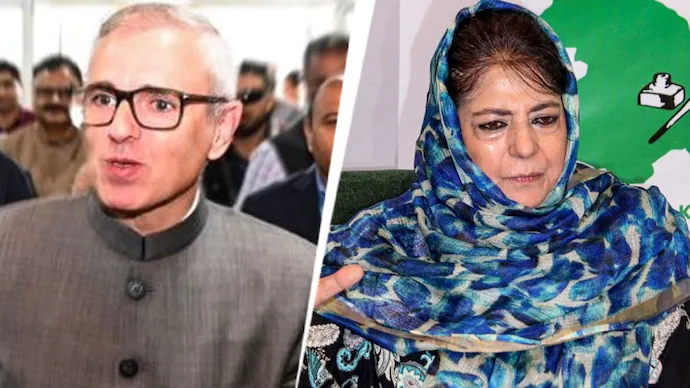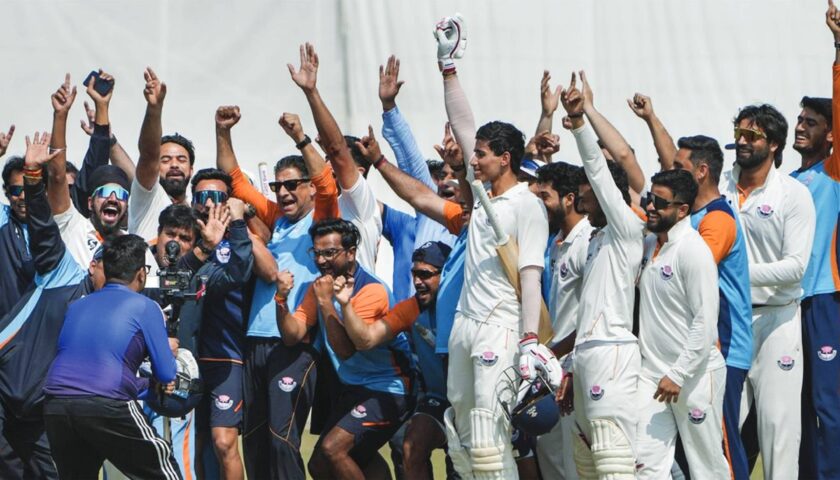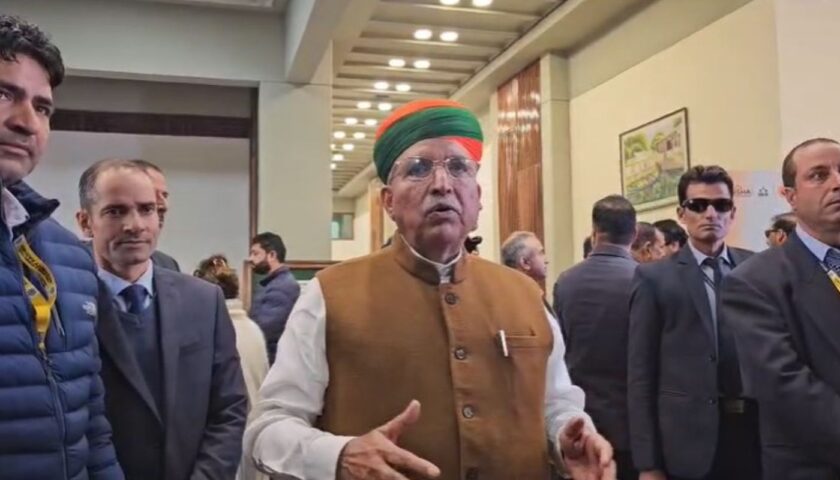Land, Dignity, Trust: Mehbooba Mufti’s Accusations and the Omar Abdullah Government under the Microscope
By: Javid Amin | 08 October 2025 | Srinagar
In a forceful address in Anantnag, Peoples Democratic Party (PDP) president Mehbooba Mufti launched a blistering critique of the Omar Abdullah-led National Conference (NC) government, charging it with failing to protect the land rights, dignity, and future of the people of Jammu & Kashmir. Her speech, laden with political gravitas, comes at a time when expectations from the NC, which came to power promising restoration of rights and identity, are high.
Below is a thorough assessment of her allegations, what can be verified, what remains unclear, the broader political context, stakes for the future, and what this means on the ground.
Key Allegations by Mehbooba Mufti
Mehbooba’s speech in Anantnag is a compilation of grievances that resonate deeply in Jammu & Kashmir’s complex political and social landscape. Here are the core charges she leveled, with details:
| No | Allegation | What was said / implied |
|---|---|---|
| 1. Land Protection | The Omar Abdullah government has permitted “backdoor land transfers”, is not safeguarding community and agricultural lands—especially in rural & tribal regions—and is silent on rules that may threaten lease holders. | |
| 2. Identity & Dignity | Mufti contends that there is demographic dilution, loss of property rights, erosion of cultural identity, and insufficient action in defending common rights and safeguards. | |
| 3. Youth Betrayal | She accuses the government of abandoning the youth: no visible employment policy, little skill development planning, rising unemployment, few opportunities. | |
| 4. Tourism & Resource Outsourcing | The claim is that tourism and resource extraction are being handed over to external players (outsiders), bypassing local institutions and people. | |
| 5. General Unkept Promises | That promises made at election time—dignity, development, identity—have been replaced by silence, inaction and disillusionment. |
What the Verifiable Evidence Shows
In parsing Mehbooba’s claims, it’s useful to check what is on record, what official responses exist, and how credible various assertions are. Important to note: some of her criticism refers to recent (2023-25) government moves, others to earlier or overlapping ones. Not everything lines up cleanly, but much of it has a basis in documented controversies.
1. Land Laws, PMAY and Landless / Homeless Allotments
-
-
The scheme to allot land under Pradhan Mantri Awas Yojana – Grameen (PMAY-G) in J&K has been controversial. An announcement in mid-2023 said that approximately 2.57 lakh households identified as “houseless” under SECC-2011 survey, plus a PMAY wait list from 2018–19, would get benefit.
-
Mehbooba Mufti raised questions over the sharp jump in reported “houseless / landless” from about 19,047 families in earlier data to nearly 2 lakh, suggesting that identification of beneficiaries is opaque and that there may be demographic or political motivations.
-
The government, however, has defended its process: stating that many eligible persons were left out in earlier surveys, that one of the criteria under PMAY-G is lack of land or land that cannot be built upon, and that the proposal for land allotment is limited to “left-out” cases from permanent waiting lists.
-
2. Land Grant Rules 2022 / Eviction Risks
-
-
According to recent reports (Times of India, Oct 9, 2025), one specific grievance is that the Land Grant Rules, 2022 under the NC government prevent renewal of leases of certain institutions and hotels. This has triggered fears of eviction or government takeover among those holders of such leases.
-
Mufti’s party has proposed a Jammu & Kashmir Land Rights and Regularisation Bill, 2025 (the so-called “Anti-bulldozer Bill”) to regularise land holdings of people, families, institutions who’ve been in possession for over 30 years. This would aim to grant ownership rights, protect from arbitrary eviction, and bring stability.
-
3. Identity, Demography & Cultural Concerns
-
-
Mufti has often tied land and property issues to identity. In earlier public remarks, she has claimed that policies post-2019 (after abrogation of Article 370 / 35A) have facilitated demographic change, resource outsourcing, and diluted protections that previously existed.
-
She also alleges that tribal communities — Gujjars, Bakerwals, Paharis, among others — have faced land evictions, and that trade and other livelihoods along the borders (e.g. trade via Poonch-Rawalakot, Uri-Muzaffarabad) have seen disruptions.
-
4. Youth Unemployment, Skill Development, Employment Policy
-
-
This is less well documented (as of the latest reports) in terms of concrete statistics comparing before/after performance. But there is wide acknowledgment in media and civil society that youth unemployment in Kashmir remains a major concern. Measurable policies are criticized for being either delayed or inadequate. Mehbooba and others have pointed to absence of detailed policy rollout.
-
Further, issues like delays in police verification, alleged misuse of job-schemes, or lack of employment outcomes are repeatedly raised in political speeches, though verified data is harder to come by.
-
5. Tourism, Natural Resources & Outsourcing
-
-
The claim about “outsourcing tourism” refers to contracts or responsibilities given to non-local contractors or external players, perhaps marginalizing local businesses. There are public criticisms about how post-2019, many development/contract projects have been handled, but detailed data on how much local vs outsider contractors benefit is less consistently available in open sources.
-
Resource exploitation (e.g. sand, possibly lithium) has been flagged in some of Mufti’s earlier speeches, claiming central/state decisions grant access or leases to outside actors. These are more claims than fully documented audits in available sources.
-
What Remains Unclear or Disputed
While many of Mehbooba’s claims have elements of truth or basis in existing controversies, as is typical in political discourse, some aspects need further verification or are contested by government sources:
-
Numbers & Data Discrepancies: The sharp increase in reported households/families who are “houseless / landless” is a key point of contention. Whether errors in surveys, inclusion criteria, or deliberate inflation are responsible is disputed. The government claims some of Mufti’s numbers misrepresent scheme coverage.
-
Demographic ‘Change’: While concerns over identity and inputs of “outsiders” are frequently raised, concrete, independently verified evidence of systematic demographic alteration via land allotment post-2023 remains lacking in open reliable sources. Official responses often deny such claims, or say the procedures have safeguards.
-
Youth Policy Implementation: Many accusations focus on lack of policy or absence of visible results; but specific government blueprints, budget allocations, implementation metrics are not always publicly available for cross-checking.
-
Outsourcing vs Local Participation: The extent to which outsiders are gaining tourism contracts or resource leases is less easy to track from media reporting. Without transparency in procurement contracts and disclosure of bidders, this remains partially speculative.
Political Context: Why These Accusations Matter Now
To understand why Mehbooba Mufti is making these allegations strongly now, one must consider the political dynamics in Jammu & Kashmir since 2019, voter expectations, and the position of NC as the ruling party.
-
In August 2019, the central government abrogated Article 370 and Article 35A, altering many constitutional, administrative, and property/land rights structures in J&K. Many promises by various parties before the 2020s made identity, land protection, and state special status central themes.
-
The NC came to power promising restoration of dignity, identity, development and representation, especially for rural, tribal belt communities. There is high public expectation for visible improvements.
-
Opposition parties, particularly the PDP under Mehbooba, have sought to portray the NC government as having failed to deliver, in order to rejuvenate their political base ahead of upcoming municipal, legislative or parliamentary contests.
-
Civil society and local communities are increasingly vocal: land rights, youth employment, preservation of culture and local control over resources are among the major issues that shape everyday discontent.
On the Ground: What People Say & Feel
Beyond political statements, ground reports from Anantnag, other parts of South Kashmir, tribal belt areas, and rural zones indicate a mix of frustration, anxiety, and in some cases despair. While I could find less detailed primary source interviews in the latest press, recurring themes in local media & reports:
-
Farmers in tribal/rural belts express concern over land titles, clarity of ownership, and fear that leases or common lands may be reclassified or taken away.
-
Youth in Kashmir often mention that even when recruitment or skill development programs are announced, delays, bureaucratic hurdles (especially verification, paperwork, domicile certificates) prevent meaningful access.
-
Local tourism businesses in places like Pahalgam, Gulmarg have complained about competition from big players and external contractors, particularly in infrastructure, events, construction etc.
-
Many in Jammu region and in tribal communities feel neglected both in service delivery and in policy voice, which reinforces concerns about identity and representation.
The Stakes: What Is at Risk
The accusations are not just rhetoric. If the NC government does not respond to them credibly, the following risks loom:
-
Erosion of Trust: For parties like NC who came in on promises of dignity & identity, failing to address such fundamental concerns could alienate their base.
-
Political Polarization: Issues of identity, land, outsider vs local will intensify polarization, possibly communal or regional.
-
Youth Disillusionment: If youth perceive that employment and opportunity remain beyond reach, this can lead to apathy, unrest, or support sliding toward parties promising more radical change.
-
Legal/Administrative Repercussions: Bills such as the “Land Rights & Regularisation Bill, 2025” may face legal challenges, or may conflict with central laws. Eviction fears among institutions could lead to litigation or administrative turmoil.
-
Cultural & Social Fabric: Perceived demographic changes, loss of community lands, erosion of customary rights (especially for tribal or pastoralist groups) impact not just property but identity, culture and social cohesion.
How the Government Has Responded
-
In many cases, the government has issued official clarifications. For example, in the PMAY land allotment controversy, the administration clarified criteria for “homeless/houseless/landless” status, explained who is eligible, what lands are to be allotted, and what construction rights apply. Outlook India+2The Indian Express+2
-
On the Land Grant Rules, 2022, the government has not, as of the latest reports, reversed them, but is under political pressure. The proposed “Anti-bulldozer Bill” by the PDP is an attempt to force legislative attention. The Times of India
-
Government media returns often deny demographic change or misuse, saying that processes are being followed, that lease renewals etc are bound by law, and that claims are inflated or lack evidence.
Analysis: How Strong Are Mehbooba’s Critiques—and Where She May Be Vulnerable
Strengths:
-
Many of her criticisms align with grievances expressed by ordinary people on ground: the youth, farmers, tribal communities. That gives her rhetoric resonance.
-
The numbers and escalations (e.g. PMAY data) provide concrete anchors to her arguments—increases, changes, possible irregularities—that make it harder for the NC to dismiss everything.
-
Her proposals (like regularization of long-held land) are politically appealing, especially to those with insecure property rights or leaseholds.
Weaknesses or Vulnerabilities:
-
Some charges depend on assumptions or unverified data (e.g. number of ‘outsiders’ benefiting, exact scale of demographic change), which the government can push back on.
-
She must provide more empirical data—case studies, documented instances—to test claims about tourism outsourcing or resource contracts. Without evidence, some claims may be dismissed as political hyperbole.
-
The proposed interventions (e.g. Anti-bulldozer Bill) will need to survive administrative/legal scrutiny; if overhyped without administrative feasibility, may be seen as political theater.
Possible Paths Forward
Given what’s at stake, here are some choices the NC government and opposition (including PDP) might consider to defuse tension, or respond in ways that build credibility:
-
Transparent Audit and Mapping
Government could commission an independent audit of all land grant rules, lease renewals, and property transfers since taking office; map how many people have been affected, institutions under risk of eviction, and document case by case. -
Clear Beneficiary Data Disclosure
In the PMAY / landless allotment scheme, publishing full data: who is getting land, from which areas, under what conditions (domicile, past survey inclusion, etc.), can build trust. -
Youth Policy Document & Timetable
A detailed youth employment and skill development roadmap with timelines, budgets, and measurable targets would help. This should include improving domicile verification processes, reducing bureaucratic delays, and enabling local youth to participate in tourism/natural resource sectors. -
Institutional Oversight & Legal Safeguards
Laws for regularization (like the proposed bill) need built-in safeguards for fairness, so they do not simply benefit politically connected people or override existing rights of communities. -
Engage Tribal & Rural Leaders
Given sensitivities among tribal communities (Gujjars, Bakerwals, Paharis), and in rural belts, ensuring their voices in policy committees, dispute resolution, and land rights processes is essential. -
Communication & Accountability
The government needs to address allegations proactively, both at the administrative level and via media, showing actions taken rather than just denials.
Bottom-Line: Trust, Dignity, and the Road Ahead
Mehbooba Mufti’s speech in Anantnag is more than a political attack; it reflects deeper anxieties among the people about identity, ownership, and belonging. Land is not just an economic asset in Jammu & Kashmir—it is bound up with dignity, history, community, and justice.
For Omar Abdullah’s NC government, promises once centered on restoring identity, dignity, and development now face hard scrutiny. Executing policy, creating transparency, defending rights—not just of a few but of many—is the test. Whether NC responds with bold action or continues with incremental rhetoric could determine not just political fortunes but social cohesion.
In Kashmir, where the past is always present, land, identity, and dignity aren’t abstract themes but daily lived realities. The battle for them is real—and how it unfolds in the coming months may shape more than elections; it may shape how people feel about their home.




